DOC
IMPORTANT DOCUMENT ON CONDUCT IN EAST SEA
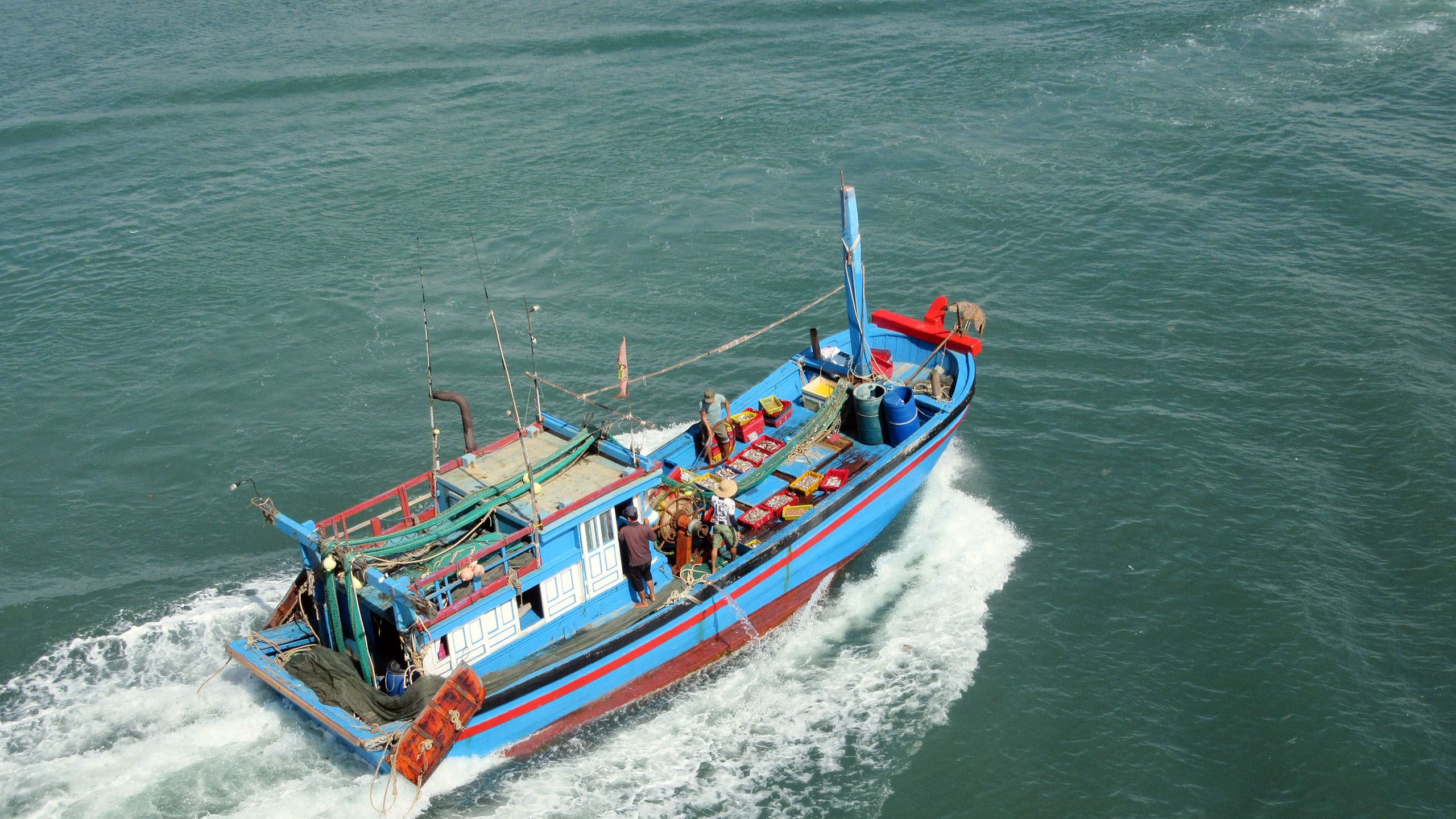
The Declaration on the Conduct of Parties in the East Sea/South China Sea (DOC) was signed between ASEAN countries and China on November 4, 2002, at the 8th ASEAN Summit in Phnom Penh, Cambodia.
The DOC is the first political document reached by ASEAN and China concerning the East Sea issue and is regarded as a breakthrough in relations between the two sides. On that basis, the parties concerned have pledged to continue implementing the DOC fully and effectively, helping to maintain peace, stability and cooperation in region; further deepening the ASEAN-China partnership; and striving to promote the building of an effective Code of Conduct in the East Sea (COC) in line with international law and the 1982 United Nations Convention on the Law of the Sea.
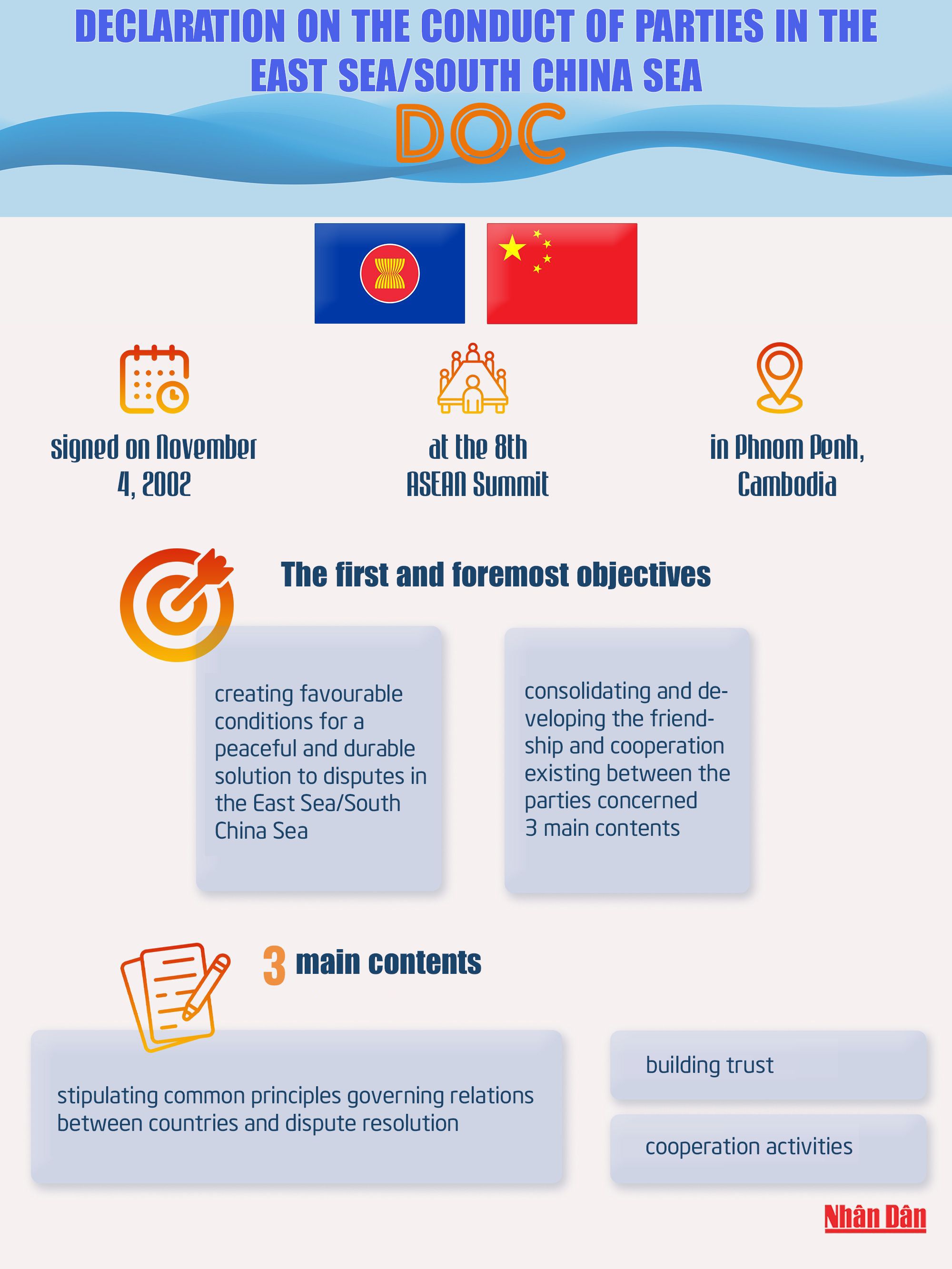
THE FORMATION OF THE DOC
HOW WAS THE DOC BORN?
The East Sea/South China Sea is a semi-enclosed sea in the Pacific. As a busy international maritime route with rich reserves of natural resources, the East Sea/South China Sea is associated with the interests of many countries both in and outside the region.
Amid complicated developments in the East Sea in the late 1980s and early 1990s, both ASEAN and China recognised the need for a code of conduct, to regulate the behaviour of related parties in the East Sea. ASEAN and China officially launched the negotiation process on a Code of Conduct in the East Sea (COC) in 2000.
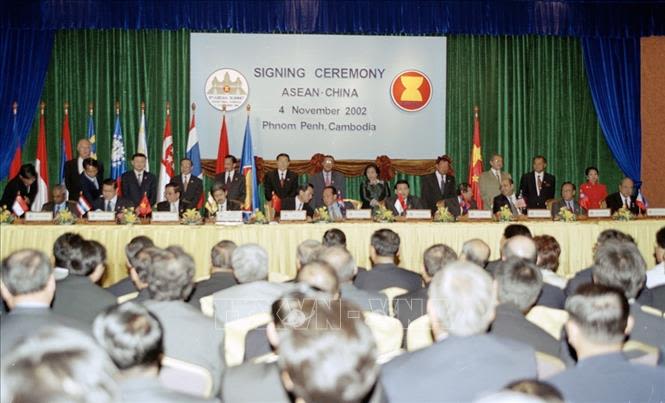
ASEAN countries and China jointly signed the DOC at the 8th ASEAN Summit in Phnom Penh, Cambodia, on November 4, 2002 (Photo: VNA)
ASEAN countries and China jointly signed the DOC at the 8th ASEAN Summit in Phnom Penh, Cambodia, on November 4, 2002 (Photo: VNA)
During the COC negotiation process, ASEAN and China agreed, in the immediate future to adopt DOC as a political document between the two sides, to create a basis for maintaining peace and stability in the East Sea. At the 8th ASEAN Summit in Phnom Penh, Cambodia on November 4, 2002, ASEAN countries and China jointly signed the DOC.
The DOC demonstrates numerous commitments to comply with international law, the 1982 United Nations Convention on the Law of the Sea (UNCLOS), the Five Principles of Peaceful Coexistence, the Treaty of Amity and Cooperation in Southeast Asia (TAC), as well as commitments on encouraged and restrained behaviours in the East Sea.
WHAT ARE KEY CONTENTS INCLUDED IN DOC?
The first and most important purpose of the DOC stated in the opening part of the Declaration is to create favourable conditions for the search for a peaceful and lasting solution, to disputes in the East Sea and strengthen the existing friendship and cooperation between the signatories.
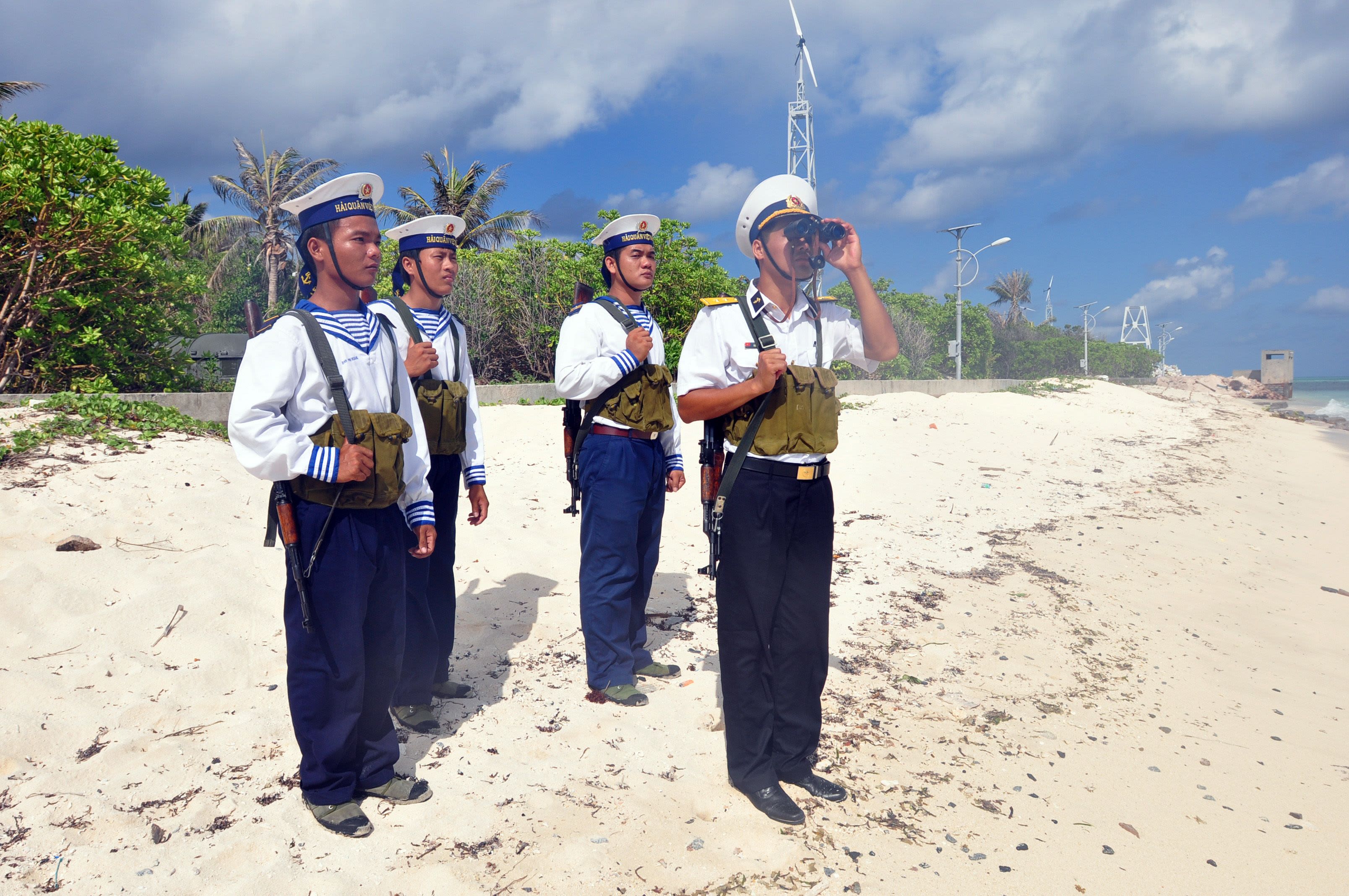
Navy soldiers on Namyit Island. (Photo: DUY LINH)
Navy soldiers on Namyit Island. (Photo: DUY LINH)
The DOC features three main groups of content, including regulations on general principles governing relations between countries and dispute settlement; trust building; and cooperative activities.
Article 1 of the DOC reaffirms the commitment of the parties to apply the principles of international law to govern relations between states as enshrined in the Charter of the United Nations and the Five Principles of Peaceful Coexistence, the Treaty of Amity and Cooperation in Southeast Asia (TAC), as well as other widely recognised principles of international law.
In Article 2, the parties commit to take necessary measures to strengthen and build trust on the basis of equality and mutual respect.
Article 3 is the commitment of the parties to freedom of navigation and overflight in the East Sea.
Article 4 states the obligation of the parties to settle their territorial disputes by peaceful means, without using or threatening to use force, through direct negotiations between sovereign states, on the basis of the generally accepted principles of international law, including UNCLOS.
Specific measures to promote and build confidence are concretised in Article 5, under which the general obligation of states is to exercise self-restraint, to refrain from actions that could complicate and escalate disputes and affect peace and stability. It also clearly defines the occupation of islands, rocks, shoals, and uninhabited structures as conduct to be restrained.
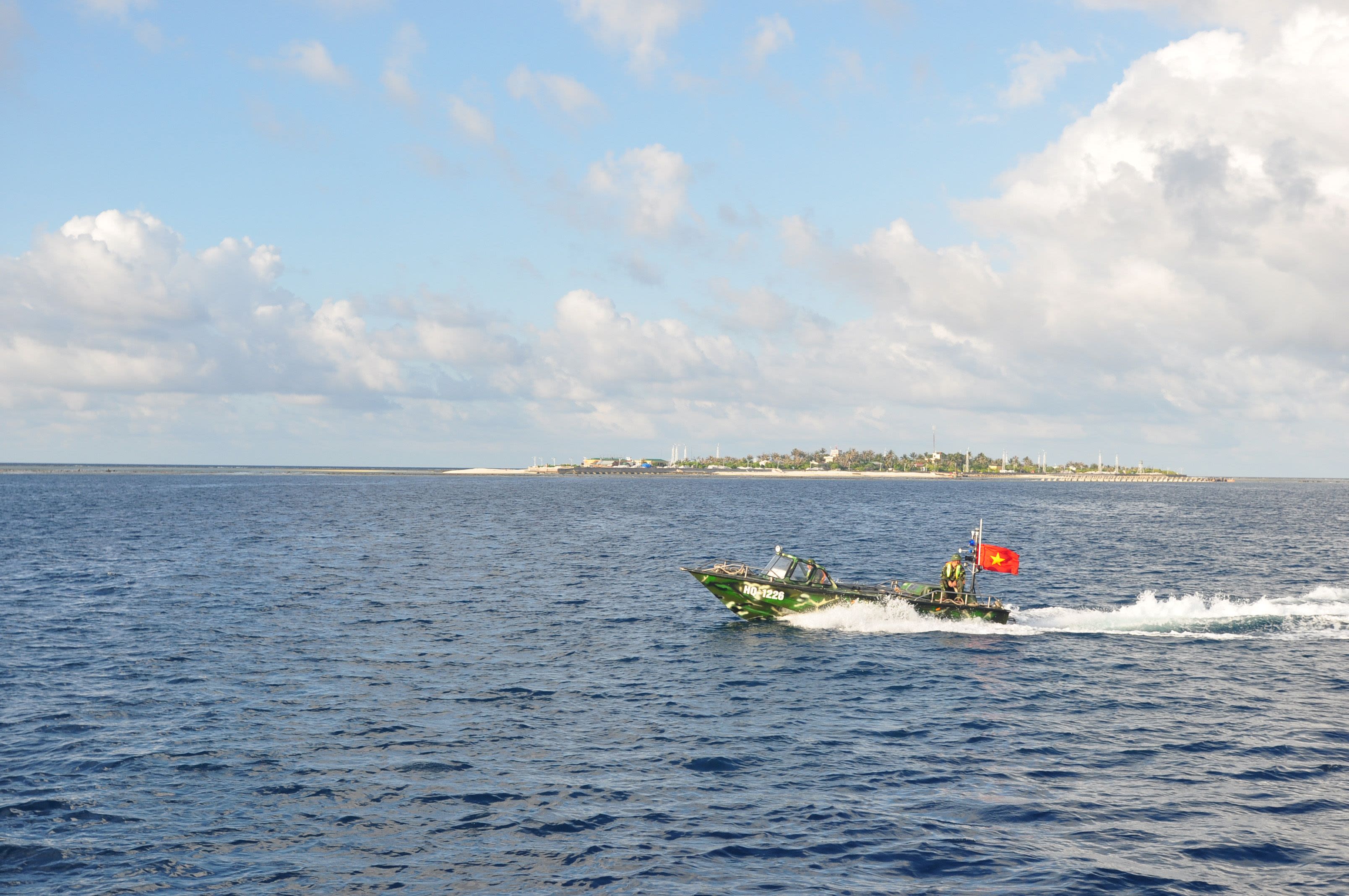
Naval soldiers of Nam Yet Island patrol to protect the country’s waters. (Photo: DUY LINH)
Naval soldiers of Nam Yet Island patrol to protect the country’s waters. (Photo: DUY LINH)
Four concrete measures to build trust between the parties include: conducting dialogue and exchange of views as appropriate between defence and military officials of the parties; ensuring fair and humane treatment of people in danger or disaster; notifying other parties of joint or coordinated exercise activities on a voluntary basis; and exchanging relevant information on a voluntary basis.
Article 6 regulates cooperative activities among the parties concerned. These may include the following: marine environmental protection; marine scientific research; safety of navigation and communication at sea; search and rescue operation; and combating transnational crime, including but not limited to trafficking of illicit drugs, piracy and armed robbery at sea, and illegal traffic in arms. Article 6 also regulates the fundamental principal for the cooperation. Accordingly, the modalities, scope and locations in respect of bilateral and multilateral cooperation should be agreed upon by the parties concerned prior to their actual implementation.
Article 7 emphasises that the parties concerned stand ready to continue their consultations and dialogues concerning relevant issues, through modalities to be agreed by them, including regular consultations on the observance of this declaration, for the purpose of promoting good neighbourliness and transparency while establishing harmony, mutual understanding and cooperation.
Articles 8, 9 and 10 reaffirm the parties’ commitments to respect the provisions of this declaration, stating that the adoption of a code of conduct in the East Sea would further promote peace and stability in the region.
WHAT IS DOC’S ROLE IN MAINTAINING PEACE AND STABILITY IN THE EAST SEA?
The signing of the Declaration on the Conduct of Parties in the East Sea (DOC) in 2002 was an important progress in the dialogue between ASEAN and China on the East Sea issue.
As the first document signed by ASEAN and China on the East Sea issue, the DOC provides a foundation to review and assess the legitimacy of the behaviour of concerned parties in accordance with their commitments. At the same time, the DOC also promotes trust-building and maritime cooperation between ASEAN and China.
The DOC also contributes to building appropriate mechanisms, forums and documents for ASEAN and China to maintain dialogue and cooperate with each other in the East Sea. This declaration sets the stage for the next steps in resolving tensions at sea, as well as towards building an effective and practical code of conduct (COC).
Strictly respecting the spirit of the DOC and fully implementing the declaration, bringing practical benefits to both ASEAN and China while contributing to ensuring a peaceful and stable environment and promoting cooperation in the region.
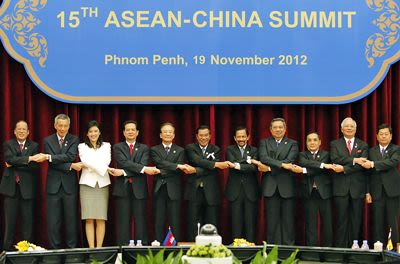
Leaders attend the ASEAN-China Summit, November 19, 2012. (Photo: VGP)
Leaders attend the ASEAN-China Summit, November 19, 2012. (Photo: VGP)
In 2012, ASEAN and China issued a joint statement commemorating the tenth anniversary of the signing of the DOC, affirming that the DOC is an important document, demonstrating the common commitments of ASEAN member states and China to promote peace, stability and mutual trust in the East Sea/South China Sea.
At the 25th ASEAN-China Summit on November 11, 2022, the leaders of ASEAN countries and China adopted a joint statement on the occasion of the 20th anniversary of the DOC; reaffirming the significance and importance of the DOC to peace, security and stability in the East Sea.
The DOC was the first political document signed between China and ASEAN countries concerning the East Sea issue, and is considered a breakthrough in bilateral relations.
VIETNAM'S STANCE ON DOC
WHAT IS VIETNAM'S STANCE ON THE DOC?
With a peaceful foreign policy, prior to the country becoming a member of ASEAN, Vietnam enthusiastically supported ASEAN Declaration on the East Sea signed in 1992. Since joining ASEAN, Vietnam has actively promoted and contributed to the development of the Declaration of Conduct of Parties in the East Sea (DOC).
Since its signing, Vietnam has always complied with the commitments of the DOC while asking the relevant countries to strictly fulfil the commitments made in this document.
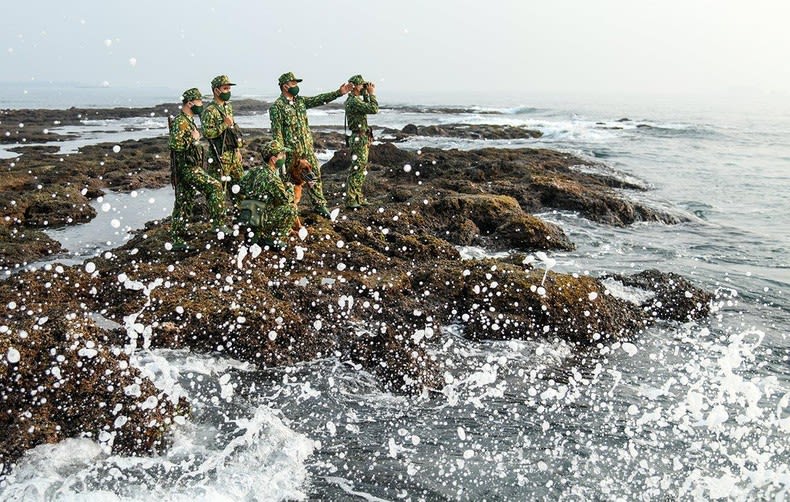
Soldiers at the Ky Ha Port border gate guard station perform the task of protecting the sovereignty and security of border areas. (Photo: THANH DAT)
Soldiers at the Ky Ha Port border gate guard station perform the task of protecting the sovereignty and security of border areas. (Photo: THANH DAT)
During the implementation of the DOC, Vietnam has always insisted on resolving all disputes related to the East Sea by peaceful means based on international law including the 1982 UNCLOS. The country has also promoted the full implementation of the DOC towards building an effective and efficient code of conduct, contributing to maintaining peace and stability in the East Sea.
In addition, Vietnam has enhanced its cooperation with relevant neighbouring countries in sea-related areas. Its efforts have been highly valued by the political world and the public in the region and the world.
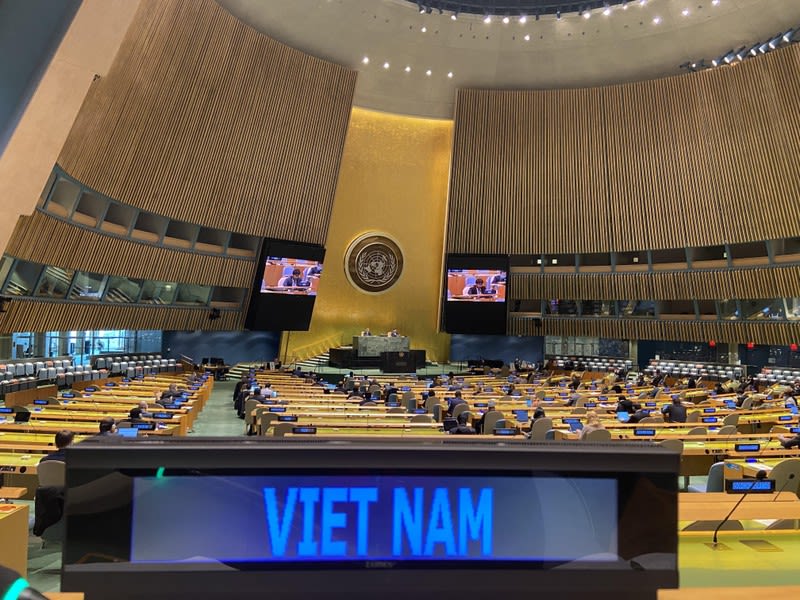
The plenary and closing session of the 30th meeting of state parties to 1982 UNCLOS on December 9, 2020. (Photo: VNA)
The plenary and closing session of the 30th meeting of state parties to 1982 UNCLOS on December 9, 2020. (Photo: VNA)
Vietnam's viewpoint on the East Sea issue is consistent with the common viewpoint of ASEAN. Along with other members, Vietnam has made significant contributions to upholding the central, proactive and active role of ASEAN in building a peaceful, stable and cooperative environment in the region, especially in ensuring respect for the principles of international law.
Published: December 2022
Production manager: CHU HONG THANG – PHAM TRUONG SON
Content: SON NINH – NHU NGOC
Translation: NDO
Design: HOANG HA - PHAN ANH
Sources: Ministry of Foreign Affairs, asean.org